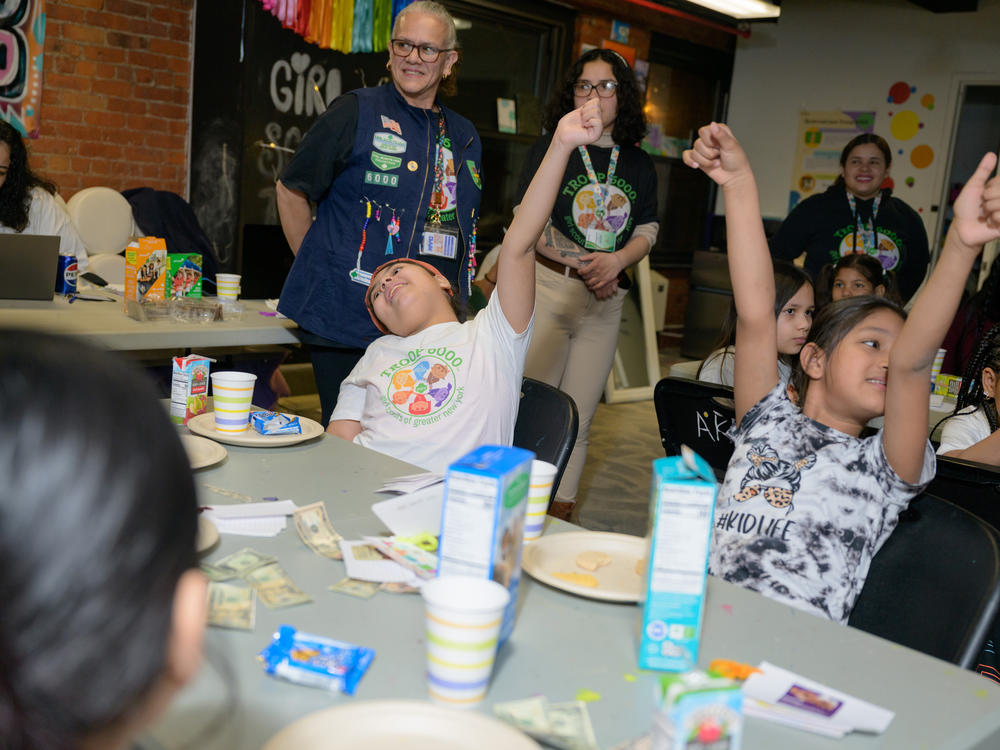Section Branding
Header Content
How this Girl Scout troop offers community to migrant children
Primary Content
Run in partnership with New York City Health and Hospitals, Girl Scout Troop 6000 serves families living in temporary housing in the city's shelter system.
One of the chapters is made up entirely of children who recently arrived in the U.S. All are from Latin America, ages kindergarten through 12, and their families are seeking asylum.
Many of the scouts in this chapter just made the dangerous journey to the U.S., with some fleeing violence in their home countries.
Juliana Alvarez, is one of the volunteers leading the group. "If it's difficult for adults," she said, "imagine how hard it is for a child to understand why they're here."
Alvarez knows exactly how these kids feel – she and her two daughters lived in the same shelter for about a year. She left her native Colombia when a local gang threatened her family. "I was scared," she said. "I heard that on the journey to the U.S. you get raped or killed."
NPR's Jasmine Garsd visited the shelter, where she met 10-year-old Tahanne from Ecuador. When asked what she wants to do when she grows up, Tahanne responded: "Do you know what the sternocleidomastoid is?" (Tahanne dreams of becoming a doctor.)
You're reading the Consider This newsletter, which unpacks one major news story each day. Subscribe here to get it delivered to your inbox, and listen to more from the Consider This podcast.
Support and community
At the chapter's regular meetings, the classic Girl Scouts activities are repurposed to provide the girls tools to navigate the U.S., and New York City.
Selling cookies, for example, becomes an exercise in math and learning American currency. They earn badges, go on field trips and learn to traverse the subway system.
Shereen Zaid, senior director of logistics for New York City Health and Hospitals, said the meetings offer the consistency needed to positively impact the lives of the scouts.
"If we could have some of the girls meet twice or three times a week and just color together, or sing together or talk about community development together, that is such a win," Zaid said. "They come here with a suitcase or one backpack, and so we are trying to help them live an actual fulfilling life."
The group also has two master of social work candidates who attend every meeting to monitor the children for signs of anxiety and depression.
"Outside of these doors, it is trauma," said Meredith Mascara, CEO of Girl Scouts of Greater New York.
A moment of normalcy
Troop 6000 expanded its program as the city saw an influx in immigrant families. Now, the program is a refuge for asylum seekers.
"This is probably the only sense of stability they have right now," said Giselle Burgess, founder and senior director of Troop 6000. Burgess got the idea for the troop over a decade ago, when she and her daughters were living in a shelter in Queens.
The city has implemented a 60-day rule for migrant families' shelter stays. When NPR visited the group, Tahanne, the hopeful doctor, had run out of time. She was scheduled to leave the shelter the next day. According to Documented, at least 40 families have been evicted from the shelter since January.
When scouts leave the shelter, they have the option to continue participating remotely via Zoom. But at the time, Tahanne frowned at the prospect.
"We share everything here," she said. "We come here to be friends. These are my sisters now."
Visit the shelter and hear the scout's stories by tapping the play button at the top of the page.

